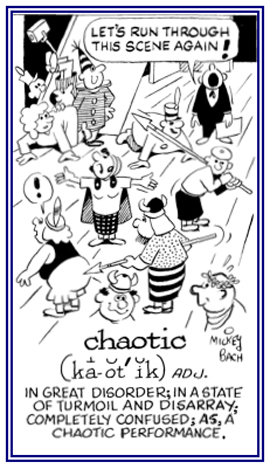-ic
(Greek: a suffix; pertaining to; of the nature of, like; in chemistry, it denotes a higher valence of the element than is expressed by -ous)
2. Descriptive of being in a state of complete confusion and lack of organization: Janet had a chaotic mass of books and papers in her living room.

Go to this Word A Day Revisited Index
so you can see more of Mickey Bach's cartoons.
2. The ability to perceive which side of the body is being stimulated.
3. The ability to distinguish or recognize one's own or another's hand or parts of the hand.
2. Someone who practices or is concerned with the curing of disease by manipulation of the structures of the human body; especially, those of the spinal column.
Concepts and Origins of Chiropractic Treatments
Chiropractic is grounded in the principal that the body can heal itself when the skeletal system is correctly aligned and the nervous system is functioning properly. To achieve this, the chiropractor uses his or her hands or an adjusting tool to perform specific manipulations of the vertebrae.
Chiropractic applications are now one of the most popular alternative therapies currently available. Some would say it now qualifies as "mainstream treatment" as opposed to complementary medical approaches.
Daniel D. Palmer is the founder of modern chiropractic theory, dating back to the 1890s. A grocer and magnetic healer, he applied his knowledge of the nervous system and manual therapies in an unusual situation. One renowned story concerns Harvey Lillard, a janitor in the office where Palmer worked. The man had been deaf for seventeen years, ever since he had sustained an injury to his upper spine. Palmer performed an adjustment on a painful vertebra in the region of the injury and Lillard's hearing was said to be restored.
Palmer theorized that all communication from the brain to the rest of the body passes through the spinal canal, and areas that are poorly aligned or under stress can cause physical symptoms both in the spine and in other areas of the body. So the body has the innate intelligence to heal itself when unencumbered by spinal irregularities causing nerve interference. After his success with Lillard, other patients began coming to him for care, and responded well to adjustments. This resulted in Palmer's further study of the relationship between an optimally functional spine and normal health.
Osteopathy is another related holistic discipline that utilizes spinal and musculoskeletal manipulation as a part of the physical treatment, but osteopathic training is more similar in scope to that of an M.D.


